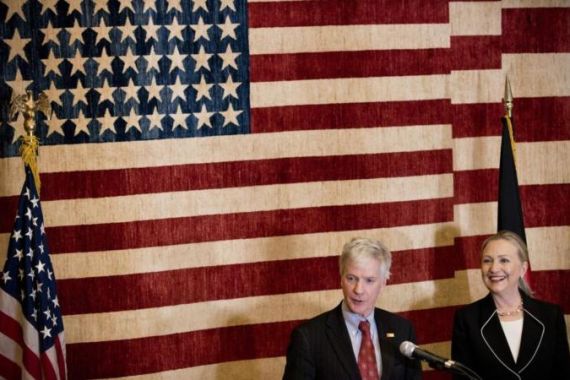Clinton in Kabul ahead of Afghan aid talks
US secretary of state arrives in Afghan capital on unannounced visit shortly before major aid conference in Tokyo.

Hillary Clinton, the US secretary of state, has arrived in Kabul on an unannounced visit, just ahead of a major international conference in which Afghanistan is set to seek billions of dollars in civilian aid.
“Considering that we were almost literally flying by, the secretary wanted to be able to stop in Kabul en route to Tokyo,” a senior state department official travelling with her said on Saturday. The aid conference will be held in the Japanese capital.
Clinton held a breakfast meeting with President Hamid Karzai, as his government expressed hopes that participants in the Tokyo summit would pledge $4bn to Afghanistan. US officials have not said how much they plan to commit.
The United States also announced on Saturday that it would designate Afghanistan a “major non-NATO ally”, a status that will make it easier for the Afghan government to acquire US military equipment.
‘Enduring commitment’
The official travelling with Clinton said there would be a principle of “mutual accountability”, which would require the Afghan government to curb corruption and improve transparency in order to keep receiving aid.
“The international community will continue to come together and show this enduring commitment that will be at or near levels that we’ve used over the past decade,” the official said.
In 2012, the United States gave $2.3bn in civilian aid to Afghanistan.
After more than 30 years of war, the Afghan economy is weak, and the country cannot survive without foreign aid. Spending on defence and development by donors accounted for more than 95 per cent of GDP in 2010-2011, according to the World Bank.
The government in Kabul can cover only $2bn of the $6bn it spends each year, not counting security costs. Donor nations make up the difference.
Japanese Foreign Minister Koichiro Gemba, who will jointly chair the Tokyo conference, said he hoped it would result in pledges of at least $3bn per year. But in an interview with the Asahi Shimbun newspaper published on Friday, he also warned of conditions for Karzai’s government.
“[Kabul] must improve its governance capacity, including eradicating corruption,” he said.